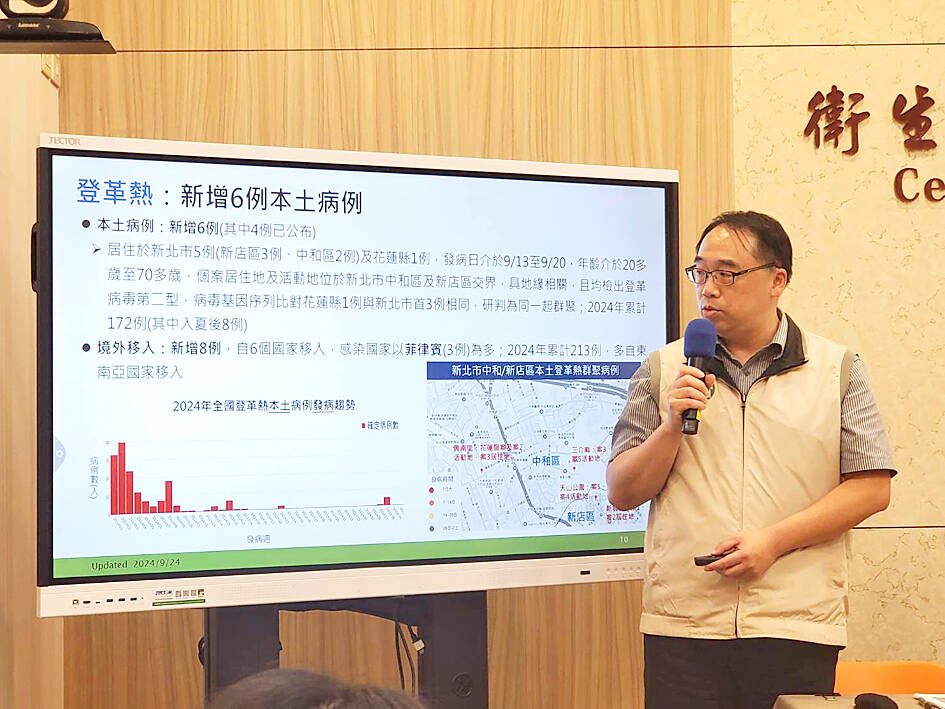This year’s first cluster of dengue fever cases in northern Taiwan was detected in New Taipei City, the Centers for Disease Control (CDC) reported yesterday, adding that the number of enterovirus cases continued to increase, with the epidemic period likely to extend into November.
CDC Epidemic Intelligence Center Director Guo Hung-wei (郭宏偉) said six cases of locally acquired dengue fever were reported from last week to yesterday, including five in New Taipei City and one in Hualien County, and the people began having symptoms between Sept. 13 and Friday last week.
The agency through contact tracing discovered that the cases all live or had recently been near the area where New Taipei City’s Jhonghe (中和) and Sindian (新店) districts meet, he said.

Photo: Lin Hui-chin, Taipei Times
They were also found to be infected with dengue virus serotype 2 (DENV-2), and the Hualien case and three cases in New Taipei City have the same viral genome sequence, so they are considered to belong to the same cluster, he said.
CDC Deputy Director-General Philip Lo (羅一鈞) said the two cases confirmed yesterday had showed unusual symptoms of diarrhea and vomiting.
Physicians and people in the area should be aware that aside from common symptoms of headache and fever or pain behind the eyes, infected people might also have gastrointestinal symptoms, he said.
The New Taipei City Government yesterday closed the hiking trails near Sanjie Temple (三介廟) and Tianshan Park (天山公園) for a month, after finding out that two of the cases had been in the area during the incubation period, Lo said.
The local government has begun a large-scale disinfection operation, and the cluster would be monitored until Oct. 21, he said.
Lo urged people who have recently visited nearby areas and show suspected dengue symptoms to seek medical attention as soon as possible and tell their doctor about their visit to the area.
Meanwhile, Guo said 16,253 hospital visits for enterovirus infection were reported last week, another week of increase.
The CDC’s monitoring data showed that coxsackievirus A10 and coxsackievirus A16 were the two main viral strains circulating in the past four weeks, he said.
A mild case of enterovirus D68, a four-month-old infant, was reported and he recovered, Guo added.
There were 146,558 hospital visits for diarrhea reported last week, also an increase, he said.
“After the Mid-Autumn Festival, hospital visits for diarrhea and enterovirus infection have continued to increase, and we expect the trend to continue this week, likely reaching a peak in early next month,” Lo said.
The recent enterovirus outbreak appeared to be more complicated than initially thought, he said, adding that the two Coxsackievirus strains are competing for dominance.
Cases are likely to increase until the middle of next month, reaching a peak of about 17,000 hospital visits per week, he said.
The number of weekly cases is likely to drop below the epidemic threshold (11,000 hospital visits per week) in mid-to-late November, he added.
There are no vaccines for enterovirus strains other than the enterovirus A71 vaccine, so children and caregivers should especially maintain good personal hygiene, and children’s learning environments and homes should have good ventilation and routine disinfections, it said.

A strong continental cold air mass is to bring pollutants to Taiwan from tomorrow, the Ministry of Environment said today, as it issued an “orange” air quality alert for most of the country. All of Taiwan except for Hualien and Taitung counties is to be under an “orange” air quality alert tomorrow, indicating air quality that is unhealthy for sensitive groups. In China, areas from Shandong to Shanghai have been enveloped in haze since Saturday, the ministry said in a news release. Yesterday, hourly concentrations of PM2.5 in these areas ranged from 65 to 160 micrograms per cubic meter (mg/m³), and pollutants were

Taiwan’s armed forces have established response protocols for a wide range of sudden contingencies, including the “Wan Chun Plan” to protect the head of state, the Ministry of Defense (MND) said today. After US President Donald Trump on Saturday launched a series of airstrikes in Venezuela and kidnapped Venezuelan President Nicolas Maduro, concerns have been raised as to whether China would launch a similar “decapitation strike” on Taiwan. The armed forces regularly coordinate with relevant agencies and practice drills to ensure preparedness for a wide range of scenarios, Vice Minister of National Defense Hsu Szu-chien (徐斯儉) told reporters before a

EVA Airways on Saturday said that it had suspended a pilot and opened an investigation after he allegedly lost his temper and punched the first officer several times as their plane was taxiing before takeoff at Los Angeles International Airport. According to a report published on Thursday by The Reporter, the incident occurred after the flight’s Malaysian first officer tried to warn the Taiwanese pilot, surnamed Wen (文), that he was taxiing faster than the speed limit of 30 knots (55.6kph). After alerting the pilot several times without response, the first officer manually applied the brakes in accordance with standard operating

NOT AN OPENING: Trump’s violation of international law does not affect China’s consideration in attacking Taiwan; Beijing lacks capability, not precedent, an official said Taiwanese officials see the US’ capture of the president of Venezuela as a powerful deterrent to Beijing’s aggression and a timely reminder of the US’ ability to defeat militaries equipped with Chinese-made weapons. The strikes that toppled Venezuelan President Nicolas Maduro signaled to authoritarian leaders, including Chinese President Xi Jinping (習近平), US President Donald Trump’s willingness to use military might for international affairs core to US interests, one senior official in Taipei’s security circle said. That reassured Taiwan, the person said. Taipei has also dismissed the idea that Trump’s apparent violation of international law could embolden Beijing, said the official, who was not